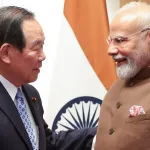In a recent spate of events, the Chief Justice of India (CJI) DY Chandrachud has announced that a legal glossary to guide judges against the use of inappropriate gendered terms in the legal discourse will be unveiled in the near future. The said announcement was made by him while speaking at an event organised by the Supreme Court Gender Sensitisation and Internal Complaints Committee to celebrate International Women’s Day. The CJI also expressed a need to ensure zero tolerance for inappropriate behaviour and improper use of language against women- “For instance, I have come across judgments which have referred to a woman as a ‘concubine’ when she is in a relationship,” Justice Chandrachud said, adding,-“This glossary is nearing completion and will be unveiled in the very near future.” The CJI also said that this was a part of his mission that he had undertaken a few years ago and the project is nearing fruition now. The intent behind releasing the glossary is that it would comprise a list of words and terms that judges must refrain from using in verdicts as well as in court proceedings.
The trend of using words that are inappropriately gendered is not a new one. Gender stereotyping is the practice of ascribing to an individual woman or for that matter a man, specific attributes, characteristics, or roles by reason only of her or his membership in the social group of women or men. Stereotyping not only adversely affects human rights and fundamental freedoms, it is also an affront to all genders that thrive on individuality of humans. The international human rights law framework is also concerned with stereotypes and stereotyping and The Committee on the Elimination of Discrimination against Women ( CEDAW) has in fact explained that State parties are required to modify or transform “ harmful gender stereotypes” and “eliminate wrongful gender stereotyping”.
A stereotype is harmful when it limits women’s or men’s capacity to develop their personal abilities, pursue their professional careers and make choices about their lives and life plans. Both hostile/negative or seemingly benign stereotypes can be harmful. It is for example based on the stereotype that women are more nurturing that child rearing responsibilities often fall exclusively on them. A swift overview of the day to day language will prove that there are more gendered inappropriate terms used for women than for men. An example of this is the failure to criminalize marital rape based on the stereotype of women as the sexual property of men. Another example is the failure of the justice system to hold perpetrator of sexual violence accountable based on stereotypical views about women’s appropriate sexual behaviour. Discrimination against women includes those differences of treatment that exist because of stereotypical expectations, attitudes and behaviours towards women. In fact, a range of UN human rights mechanisms have highlighted how stereotypes about women’s role can be incorporated in discriminatory legislation, for example preventing women from acquiring ownership of land since only the “head of the household” is authorised to sign official documentation. The CEDAW has also time and again set out its intent to take all appropriate measures to “modify the social and cultural patterns of conduct of men and women in an effort to eliminate practices that are based on the idea of the inferiority or the superiority of either sex. There is also a growing consensus that gender stereotyping poses a significant, yet largely unaddressed challenge to the recognition, exercise and enjoyment of women’s human rights. Whether overtly hostile (such as “women are irrational”) or seemingly benign (“women are nurturing”), harmful stereotypes perpetuate inequalities. For example, the traditional view of women as caregivers means that child care responsibilities often fall exclusively on women. Further, gender stereotypes compounded and intersecting with other stereotypes have a disproportionate negative impact on certain groups of women, such as women from minority or indigenous groups, women with disabilities, women from lower caste groups or with lower economic status, migrant women, etc. Wrongful gender stereotyping is a frequent cause of discrimination against women. It is a contributing factor in violations of a vast array of rights such as the right to health, adequate standard of living, education, marriage and family relations, work, freedom of expression, freedom of movement, political participation and representation, effective remedy, and freedom from gender-based violence.
Gendered stereotypes apart from other things also affect the ability to access justice which is a human right in itself and is also key to the realisation of all other human rights, including the rights to non-discrimination and equality. It has been seen that Women often face specific barriers in their efforts to seek justice based on their sex/gender. These barriers include male guardianship laws, fear of stigma and reprisals and cultural perceptions of men (and not women) as rights-bearers. For women victims and survivors of gender-based violence, the barriers to justice are often even greater.
Former Additional Solicitor General for India and Senior Advocate Pinky Anand also explained the need to have a glossary of terms considered sexist saying that it was a necessary tool to educate some of the colleagues of what was appropriate and what wasn’t-
“It is unfortunate that we need this glossary of ‘inappropriate’ terms, but the hard truth is that we do. It is a necessary step towards gender sensitisation in a profession that needs it. I may add that we also need to address and add to the glossary the stereotypical expressions of patriarchy and notions of gender stereotyping. I think it is time for society to appreciate that dignity, and specifically human dignity, is a catalyst towards exponential growth.” said Anand.
Judicial stereotyping is such an invisible yet common and pernicious barrier to justice, particularly for women victims and survivors of violence that it often goes undetected, however, the usage of certain gender stereotypes in the judgements penned by such judges are the biggest giveaway to their thought process. Such stereotyping causes judges to reach a view about cases based on their preconceived beliefs, rather than relevant facts and actual enquiry. This thought process can have potentially wide-ranging consequences, for instance, it may not only distort the judges’ perception of the facts and affect their vision of who is a ‘victim’ but may also influence their views about witness credibility. Ultimately, however, it compromises the impartiality and integrity of the justice system, which can, in turn, lead to miscarriages of justice and the revictimization of complainants.
Women victims and survivors ‘should be able to rely on a [justice] system free from myths and stereotypes, and on a judiciary whose impartiality is not compromised by these biased assumptions’. Eliminating judicial stereotyping is therefore a crucial step in ensuring not only equality and justice for women but ensuring that gendered stereotypical words are not used while penning down judgements which are read, followed and saved for posterity.
The UN High Commissioner for Human Rights Navi Pillay also agrees that eradicating stereotyping from our judicial systems must be a priority-
“States should … take measures to eliminate wrongful gender stereotyping in all aspects of the criminal justice system…. Explicit action is required to ensure that government officials, especially those working in the justice system, do not deliver decisions based on harmful stereotypes and undermine the human rights of women and girls. Rather, officials should be identifying and challenging such negative beliefs, to help create environments that more fully respect the human rights of women and girls and build a culture of equality.”
The way forward in addressing this issue is improving the judicial capacity. Education and training is key to building capacity to address judicial stereotyping and ensuring decision-making is not adversely affected by harmful stereotypes and the usage of gendered stereotype terms while writing judgements. For instance, the UN Special Rapporteur on the independence of judges and lawyers has recognised that ‘development of training and continuing legal education programmes … is the cornerstone for developing the capacity of the judiciary to challenge gender stereotypes within and outside the criminal judicial system…’.
This education and training may however come in many forms, including seminars and written resources (eg bench books). Whatever the form, the purpose is that they should assist judges to achieve best practice in decisions on gender-based violence. At a minimum, this will require information to help judges to reach decisions based on law and fact and not on stereotypes, identify stereotyping and operative stereotypes especially in the reasoning of lower courts or in the arguments advanced by counsel, understand the harms caused by stereotypes and stereotyping, including how they undermine the ability of victims/survivors to access justice and finally to debunk stereotypes related to gender-based violence. Here it is also important to note that debunking is more than simply being able to recognize myths and stereotypes. It is about exposing the ideological and cultural foundations of the myths and stereotypes prevalent in each culture and eradicating these fictions from the reasoning of all those who interpret our general culture, and, in particular, those in positions of power who contribute to their reinforcement. Human rights advocates can also play an important role in building judicial capacity to address stereotyping and usage of gendered stereotypes like- ‘promiscuous woman’, ‘kept woman’, ‘that type of a girl’, ‘unchaste’ woman, and usage of words like ‘ravished’ to connote a woman who has been sexually exploited etc. This might include working with key bodies (eg judicial colleges) that provide education and training to judges. It might also include conducting their own education and training programmes for the legal profession and disseminating their own resources on stereotyping, including good practice approaches.





